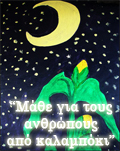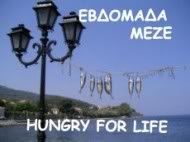Συνέντευξη του Duquende, cantaor του flamenco
Εν όψει της συναυλίας του Duquende με τον Poveda και τον Faiz στις 8 Ιουνίου, ευκαιρία να "ακούσουμε" τον Duque να μιλά για τη δουλειά του. Η συγκεκριμένη συνέντευξη έγινε πριν κυκλοφορήσει το νέο του cd "Mi forma de vivir" τον Φεβρουάριο, αλλά είναι η πιο πρόσφατη που μπόρεσα να βρω στο internet.“People are starting to recognize me”
Silvia Calado. Madrid, October 2005
Paco de Lucía is responsible for the delay of the new album by Duquende. Besides having him tied up with the ‘Cositas buenas’ Tour, he owes the Catalan cantaor some tangos which are going to be a main attraction on this new record he has been preparing with Chicuelo for over a year now. As the artist explains, it is going to be an album that is “very flamenco, very complete, in which I give free rein to what I feel”. So reveals the title, ‘Mi forma de vivir’ (‘My Way of Life’), which appears with a photo in which he is drinking “from the gypsies' fountain”. A few months after its release, he is scheduled to publish an album recorded live at Cirque d’Hiver in Paris, the same stage as Camarón in 1987.
Why has there been such a long wait for the new Duquende album?
The time I've waited has been due to Paco de Lucía's tour and other work of mine. There's been no chance to get together at the studio, due to work matters. But we've got the album nearly finished. It's just missing some tangos with Paco (de Lucía), which we'll do within a month or so. I'm more looking forward to the album coming out than the public is.
Are those tangos going to be a surprise for you?
Well, I still haven't sung them yet with Paco; I've done them with Chicuelo and Niño Josele. But I want to sing them with Paco the way he likes, so that he can stick in his guitar using my cante as inspiration.
How has the work been done on this recording?
We've worked like a little over a year on the record, the days we were able to get together at the studio. It's been a really mellow album; we've had a comfortable amount of time to do things the way we like to. I think the album is really mine, a flamenco album... my way of life.
And that cover photo?
That's the gypsies' fountain which is next to my house. That was improvised. I started drinking and the photographer who was doing a report on me saw that it was the photo for the album cover.
What styles have you worked on?
It's an album which has everything: it has soleá, it has natural fandangos, it has four bulerías, it has tangos, rumbas, it has alegrías I really like... I've also sung soleá, not soleá through bulerías, since it hasn't been heard in recordings for some time. There's a martinete with Piraña, in which the two of us are there like in the jungle with the percussions. That's what it's like. There's a bit of everything.
What's changed since ‘Samaruco’?
‘Samaruco’ was an idea of Isidro Sanlúcar's. I do stuff on that album which isn't my stuff. And I like it a lot because it gives me the name Duquende and it shakes off the shadow of ‘Camaroncillo’.
Has it been shaken off?
I think that through ‘Samaruco’, people realize I can do my own style, even though I come from that source.
Does Isidro's way of working give you another perspective? He's notorious for squeezing artists he's worked with to the max...
"With Paco de Lucía, even if you're not up to it on a given day, when you hear that guitar on stage, you're born again"
Isidro is really special; he changes things for you. If he sees the chance to squeeze you and make you go down another road... he does it. Since he said I could do everything, we were tied up there all day long. He makes you think, think a lot. And that was really good for me because I've been with his company for eight years and it's like doing solfeggio for a cantaor's voice.
What's it like working with Chicuelo?
With Chicuelo, it's about giving free rein to the things I feel and also to those he's felt. I've guided myself by my stuff, by what I like.
And between sessions, singing with Paco de Lucía...
With Paco, you can imagine. Even if you're tired, even if you're not up to it on a given day, when you hear that guitar on stage, you're born again, you can breathe again.
After so many tours, does he keep on teaching you?
Paco is an inspiration. And every day is a different experience.
You also see in his concerts how the audience appreciates you. It was unbelievable at Las Ventas Bullring...
Thank God, people are starting to recognize me...
Starting?
I think so.
Both ‘Samaruco’ and the previous record with Tomatito keep on getting really good comments...
I think they're albums that need time to be understood. When you listen to them, each day you appreciate some new detail; they're not the kind to listen to just once. When ‘Samaruco’ came out, even young people criticized me, saying the taranta wasn't a taranta; young people got angry with me. They used to say it was really weird. Over time, those same people have told me how hard ‘Samaruco’ is, how nice it is, that every time they listen to it, they like it more. That encourages you.
And are there any songs on this album that can happen to?
This album is like more professed. People's ears are trained to say "olé" where they're supposed to. You can see the feeling on this album really quickly. Though it's really deep, it's really fun; I like it a lot. Like I say, it's perfect for in the car.
Some flamencos are trying to recover the naturalness of the old recordings. Did you record anything live at the studio?
No, because I did a live album in Paris which will be coming out here in a few months. I want it to give a bit of a margin to the studio record. I recorded where Camarón recorded. We listened to it the other day and it sounded good to us. I like that album; we'll see how it's received.
There have been varied projects such as ‘Qawwali Jondo’ during this time. What has that contributed to you?
It's been a very good experience. I was lucky to have Miguel Poveda at my side and those musicians who are too much. They've got really nice voices and they do other stuff which also has a lot to do with flamenco. I think Miguel and I really noticed the bites with the singer's voice and sometimes, Pakistani stuff comes out unintentionally.
Is the tour with the new repertoire already being prepared?
We're getting a tour ready around Central America.
It seems like the right time now that Diego el Cigala has lifted the ban on flamenco in Latin America...
It's always harder for cante flamenco to reach people, but when people know you... they end up getting into it.
http://www.flamenco-world.com/artists/duquende/duquende03102005-1.htm






8 Comments:
Μας βαζεις στα αίματα συνέχεια εσύ! :-)
Ελπίζω μόνο να μπορέσει να δείξει το ταλέντο του και να μην καπελωθεί σε χαζομάρες. Έχει τέτοια φωνή και πάθος, που προσωπικά δεν έχω ακούσει καλύτερον μέχρι τώρα. Ειδικά στα live του είναι συγκλονιστικός. Δεν τον επέλεξε τυχαία ο Almodóvar στο Carne Trémula. Και ευτυχώς τον μάθαμε και οι εκτός Ισπανίας.
θα τον προτίνω και στον γαμπρό μου που είναι άρρωστος με το φλαμένκο ;)
Όλη η συνέντευξη ενδιαφέρουσα,αλλά ειδικά αυτό με το συντριβάνι..!!
Street, να του το προτείνεις, αν και θα τραγουδήσουν το qawwali flamenco με τους Πακιστανούς, δηλαδή δεν πρόκειται για flamenco puro και τον Duquende σε όλο του το μεγαλείο, δυστυχώς. Αλλά από τίποτα...
Citro μου, γυφτοσυντριβάνι, κατάλαβες; Και πάλι ευχαριστώ για το cd!
Here are some links that I believe will be interested
Here are some links that I believe will be interested
I'm impressed with your site, very nice graphics!
»
Post a Comment
<< Home